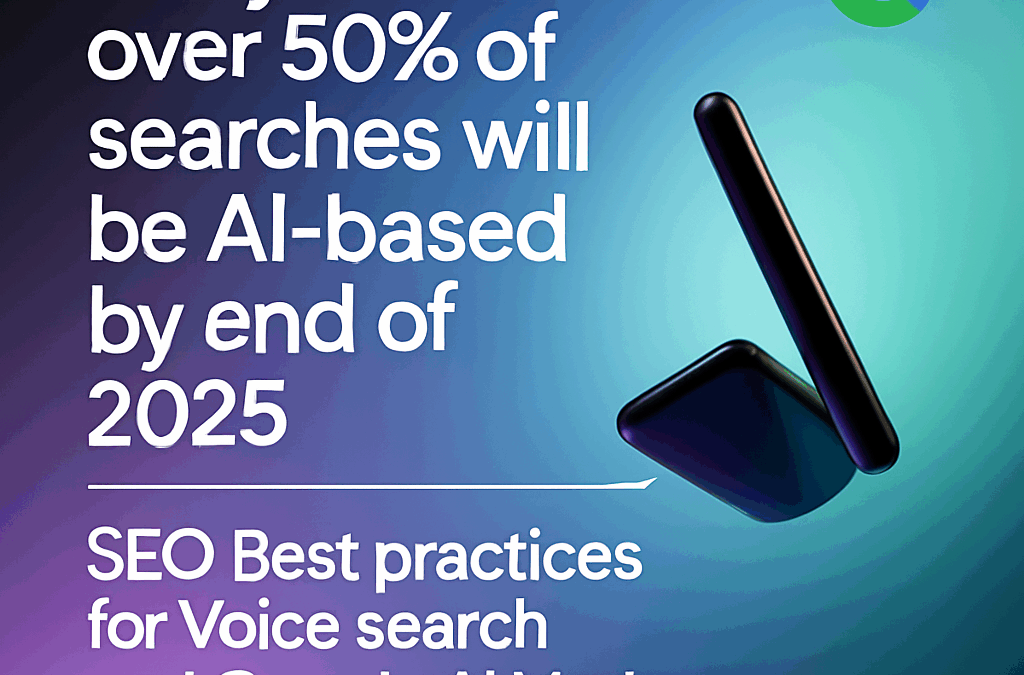You've probably heard this statistic floating around marketing circles, but let's get real about what the data actually shows. While the claim that over 50% of searches will be voice-based by 2025 makes for a compelling headline, the reality is more nuanced: though no less important for your SEO strategy.
Current research indicates that approximately 27% of the global online population uses voice search on mobile devices, with about 20.5% of people globally using voice search overall. However, what's undeniable is the explosive growth trajectory: 72% of people now use voice search as part of their daily routines, and over 1 billion voice searches are performed monthly worldwide.
The Real Voice Search Landscape Right Now
Voice search isn't just a future trend: it's reshaping how people interact with search engines today. In the United States alone, 153.5 million people are expected to use voice assistants by 2025, representing consistent year-over-year growth. More telling is the satisfaction rate: 93% of users express satisfaction with their voice assistants, leading to habitual usage patterns.

The device preferences tell an interesting story. Smartphones dominate voice search usage, accounting for 56% of all voice search activity, while smart speaker adoption is accelerating rapidly. By 2025, 55% of households are projected to have a smart speaker, creating a massive ecosystem for voice-based interactions.
What makes voice search particularly compelling for businesses is its local focus. A striking 58% of voice searches target local business information, with 76% of consumers using voice search to find local businesses. This represents a massive opportunity for businesses to capture high-intent local traffic.
How Google's AI Mode Changes Everything
Google's integration of AI into search results has fundamentally altered how voice queries are processed and answered. The AI mode doesn't just match keywords: it understands context, intent, and conversational nuance in ways that traditional search algorithms couldn't handle.
This shift means that voice search results increasingly come from featured snippets and top-ranking pages, with AI determining the most relevant, conversational answers. Voice search assistants now answer 93.7% of queries accurately, a dramatic improvement that's encouraging more users to rely on voice for complex searches.

The AI integration also means that search engines better understand multilingual queries and can provide more contextually relevant results based on location, language preference, and search history. This creates opportunities for businesses serving diverse, multilingual markets.
Essential SEO Best Practices for Voice Search
Optimize for Conversational Queries
Voice searches are fundamentally different from typed searches. People speak in complete sentences and ask full questions, not just keywords. Instead of typing "best restaurant Bangkok," voice users ask, "What's the best Thai restaurant near me in Bangkok?"
Structure your content to answer these natural language questions directly. Create FAQ sections that mirror how people actually speak, and use headers that reflect common voice query patterns.
Target Long-Tail, Conversational Keywords
Traditional SEO focuses on short, high-volume keywords. Voice search demands a shift toward longer, more conversational phrases. Instead of targeting "digital marketing," focus on phrases like "how to improve my website's search ranking" or "what digital marketing services do I need for my small business."
Prioritize Featured Snippet Optimization
Since 41% of voice search results come from featured snippets, this should be a primary focus. Structure your content to provide clear, concise answers that search engines can easily extract and present as voice responses.
Use bullet points, numbered lists, and clear paragraph breaks. Answer questions directly in the first few sentences, then provide supporting details. This format increases your chances of earning the coveted "position zero" in search results.

Optimize for Local Intent
With the majority of voice searches having local intent, local SEO becomes critical. Ensure your Google Business Profile is complete and accurate, maintain consistent NAP (Name, Address, Phone) information across all platforms, and create location-specific content.
Consider creating content that answers local questions like "where can I find digital marketing services in Pattaya" or "what web design companies are near me."
Technical Optimization for Voice Search
Page speed becomes even more critical for voice search, as users expect immediate responses. Voice search results typically load in under 4.6 seconds, so optimize your site's performance accordingly.
Implement schema markup to help search engines understand your content better. This structured data helps AI systems interpret and present your information more effectively in voice search results.
Ensure your website is mobile-friendly, since smartphones dominate voice search usage. A poor mobile experience essentially removes you from consideration for voice search results.
Leveraging Multilingual Capabilities for Global Voice Search
This is where Lion Digital Marketing's multilingual team provides a significant competitive advantage. Voice search adoption varies significantly across different languages and regions, creating unique opportunities for businesses that can optimize across multiple languages.

Our team's native-level proficiency in Thai, Danish, German, Swedish, and Norwegian allows us to understand the nuanced ways people phrase voice queries in these languages. This isn't just about translation: it's about understanding cultural context and natural speech patterns that influence how people search.
For example, Thai voice search queries might include different formality levels and cultural references that automated translation tools miss. Similarly, Scandinavian languages have subtle differences in how questions are structured that impact voice search optimization.
By optimizing content for voice search across multiple languages, businesses can capture international markets that competitors might overlook. This is particularly valuable for tourism, e-commerce, and service-based businesses operating in diverse markets.
Future-Proofing Your Voice Search Strategy
The voice search landscape will continue evolving rapidly, especially as AI technology advances. To stay ahead, focus on creating evergreen content that addresses fundamental user questions in your industry.
Build comprehensive topic clusters that cover all aspects of your business area. When someone asks a voice query about digital marketing services, you want your content to be the authoritative source that AI systems turn to for answers.

Consider the user journey beyond the initial search. Voice search users often follow up with related questions, so create content that anticipates and answers these secondary queries.
Monitor your voice search performance using tools that track featured snippet captures and position zero rankings. This data helps you understand which content formats and topics perform best for voice queries.
Making Voice Search Work for Your Business
Voice search optimization isn't just about adapting to new technology: it's about better understanding and serving your customers' needs. The conversational nature of voice search forces businesses to think about their content from the user's perspective, creating more helpful, engaging experiences.
At Lion Digital Marketing, we help businesses navigate this evolving landscape with comprehensive SEO services that include voice search optimization across multiple languages. Our team understands both the technical requirements and cultural nuances that make voice search successful in diverse markets.
Whether you're looking to capture local voice search traffic or expand into international markets, the key is starting with a solid foundation of user-focused, conversational content that answers real questions your customers are asking.
The future of search is increasingly conversational, multilingual, and immediate. Businesses that adapt their SEO strategies now will be best positioned to capture this growing segment of search traffic and build lasting organic visibility in an AI-powered search world.





